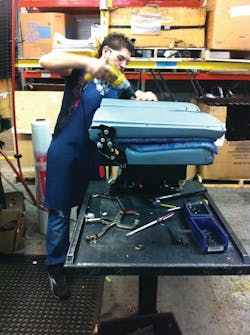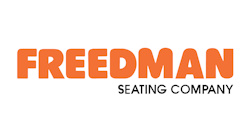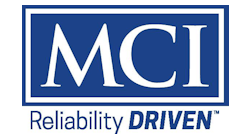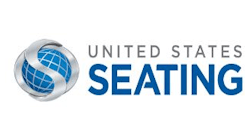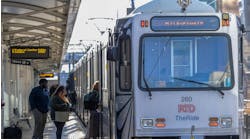Outside of Freedman Seating Co. on Chicago’s west side, there’s little indication one of the country’s major transit component manufacturers is housed inside.
A parking lot for a handful of cars sits outside an unassuming white factory building with two blue stripes going across the length of the building sits in one of the city’s impoverished neighborhoods. A small shop is situated across the street, which is torn up and decorated with one of the countless “Building a new Chicago,” found across the city advertising a capital improvement project underway.
But behind the white walls lies a company making seats that most transit riders in the U.S. have unknowingly sat on. Office employees even sit on the seats with a board room that has driver seats set up with swivel wheels instead of traditional office chairs.
And inside executive Vice President Dan Cohen’s office, he even has two classical chairs with fold out tables he found and had reupholstered with the same fabrics so he could have them for guests.
“They’re classics,” he said.
Much like the chairs, Freedman is also a classic company in transportation.
A family affair
Founded 120 years ago, the fourth generation family-owned company has deep roots in the Chicago area that includes an award certificate issued during the 1893 Columbian Exposition. Since that time it has been in several locations across the city and about 35 years being located outside of Chicago city limits.
The company was located in Ravenswood until about 14 years ago when it moved into the original Motorola factory on the city’s west side after they purchased it in 1998.
Cohen said because the area is economically disadvantaged, the city was very helpful in moving the company and helping it through its build out of the facility. It now employs more than 600 people in a 350,000 square-foot facility.
“We like this neighborhood. It’s very close to the expressways,” Cohen said. “This is a disadvantaged neighborhood, so the city was very eager to provide assistance to our moving to the neighborhood and helping finance the expansion and equipment purchases and very helpful in recruiting local labor.”
Austin Polytechnical Academy was opened in a nearby high school by Chicago Public Schools, which focuses on training students on getting jobs in manufacturing. Cohen said Freedman has “adopted” the high school and donates equipment along with sending over employees to work with programs so students can get on a path to learning how to break into manufacturing.
“It’s a trained skill. They’re good jobs,” Cohen said. “They’re relatively high paying jobs. You know, it’s not the same as being an accountant, but at the same time is a very good paying job that has great career advancement potential.”
Cohen said the company also works with the Jane Addams Resource Corp., which trains adults in manufacturing trades. Being located in Chicago, there’s not much of a talent shortage, but Cohen said engineers can be tough to come by at times.
“When Detroit’s busy, it’s tough,” he said. “When Detroit isn’t busy, it’s like there’s an endless supply of engineers.”
Quality and customization reign supreme
Although most riders, operators and transit agencies may not take major notice of bus seats, they can be some of the most custom made components of the vehicles. In fact, the level of detail can be so intricate that Cohen said it’s impossible to say how long it even takes to make an average seat.
“There’s no real answer to that,” he said. “The amount of hours can vary from five hours to 30 hours.”
With the exception of the foam and molding plastic, most of the components on Freedman seats are done in house. Some plastic comes from other Chicago based companies, while foam is purchased from companies in Wisconsin, Indiana and Pennsylvania.
Machines cut metal, then workers sand blast it and weld it, tubes are bent into place, fabric is cut and sewn together then glued onto seats after picked from 130 to 140 reams of fabrics kept in house.
“We stock well over $1 million in fabric,” Cohen said. “The reason is orders will fall from the sky.”
Each bus model, maker and purchaser has different needs and constraints. Because of the customizations welding must mostly be done by human workers in order to make various models. Some robotic welders are used for common repetitive welds.
Cohen said some agencies like AC Transit in California and MTA in New York City are now opting for hard plastic seats because some riders view them as cleaner and can wipe them down with a baby wipe before they sit down. He said they also lower the cost of the seats.
“Not only does it lower the upfront cost, but the cost of maintenance,” he said. “Fabric is going to wear out. This isn’t going to wear out. This is going to last forever.”
Orders ebb and flow at Freedman, but Cohen said an average of 175 bus sets per month are being shipped out. Freedman only supplies to companies in the U.S. and Canada, Cohen said, because it’s bulky to ship the product and the cost of labor is less overseas.
Freedman puts information out to its workers with department layout, quality policies, tracking safety, it’s policy on keeping the factory organized and quality tracking. Cohen said the company tracks a lot of metrics, but key are on time delivery and complaints.
“We track complaints whether they’re generated by a customer or the partnership,” he said. “A complaint is a complaint.”
Quality is taken so seriously at Freedman, that seating is thoroughly tested under various conditions. In the testing area a setup designed to fit a particular bus model’s wall and track test complete assembly to see how it will hold up during the life of the bus.
“What we can do is we can dial in the harmonic frequency of the bus,” Cohen said. “So we know that this bus, we know what the frequency of the bus is and we can dial that in so we can test and simulate what it’s like to be in a bus for five, 10 years. We can see if any bolts are going to loosen, any welds are going to fail, any joints that are going to crack.”
Engineers at Freedman are even working on complex issues, such as seat belts on heavy duty transit buses in order to accommodate those asking for them. Seat belts are tested for failure by loading and holding them at 5,000 pound of force and new seat belt designs are tested to stop them from wearing folding seats by having them open and close 50,000 times to see what wear occurs.
“We’re the only company in North America that offers seatbelts for seats on heavy-duty transit,” Cohen said.
But putting seat belts into a bus isn’t an easy task. Cohen said seeing as there’s no law for seatbelts for vehicles more than 10,000 pounds, there’s no standard to build the unit to, so it’s build to like it’s for a car. When doing that it means the bus builder has to make sure the vehicles holds the load of the belt, which may mean track adjustments or other modifications, which can add significant costs.
“The other part is, when you put seatbelts on, what about the standees,” he said. “Every solution begs 200 questions.”
Two companies, one misson
Cohen said Freedman seating has been making seats for companies like FedEx and UPS, along with small and midsize buses. Then about a decade ago, it decided to get into the heavy duty transit market and found one of its competitors, USSC Group, was also looking to break into that market.
Eventually the two companies started talking and then started a joint venture known as 4One. Since its inception, the company went from zero to 50 percent market share with steady growth continuing annually.
USSC handles direct sales while both companies handle OEM responsibilities while both use their strengths to succeed.
“Taking our manufacturing and engineering ability and ability to build stuff and deliver on time and USSC’s ability to make contact with the customer, understand the customer’s needs and marry that with what we can do has been the big thing,” Cohen said.
Although both companies have done rail projects in the past, Cohen and Melleady said they will continue to focus on the bus market because of the length associated with rail project and the delays accompanying them.
“We’re taking a more realistic approach about what we’ll work on,” Cohen said. “There’s very few rail seating companies. There were more, but they all go out of business and there’s only one or two left right now and we don’t want to go the way of all the other companies, so we’re being a little more careful and not biting off anything more than we can chew.”
However, the companies still are handling the uncertainty transit agencies are faced with due to federal leaders unable to create dedicated funding to obtain new infrastructure.
“The funding is an annual process,” said Ray Melleady, managing director North America for USSC. “There’s not a five year, six year, 10 year capital plan, so there’s this wish list that every transit property has and our business is driven off what they order and what they order is driven off of what they’re funded and that funding has been somewhat uncertain."

Joe Petrie | Associate Editor
I came to Mass Transit in 2013 after spending seven years on the daily newsbeat in southeastern Wisconsin.
Based in Milwaukee, I worked as a daily newspaper reporter with the Waukesha Freeman from 2006-2011, where I covered education, county and state government. I went on to cover courts for Patch.com, where I was the main courts reporter in the Metro Milwaukee cluster of websites.
I’ve won multiple awards during the course of my career and have covered some of the biggest political events in the past decade and have appeared on national programs.
Having covered local government and social issues, I discovered the importance of transit and the impact it can have on communities when implemented, supported and funded.
